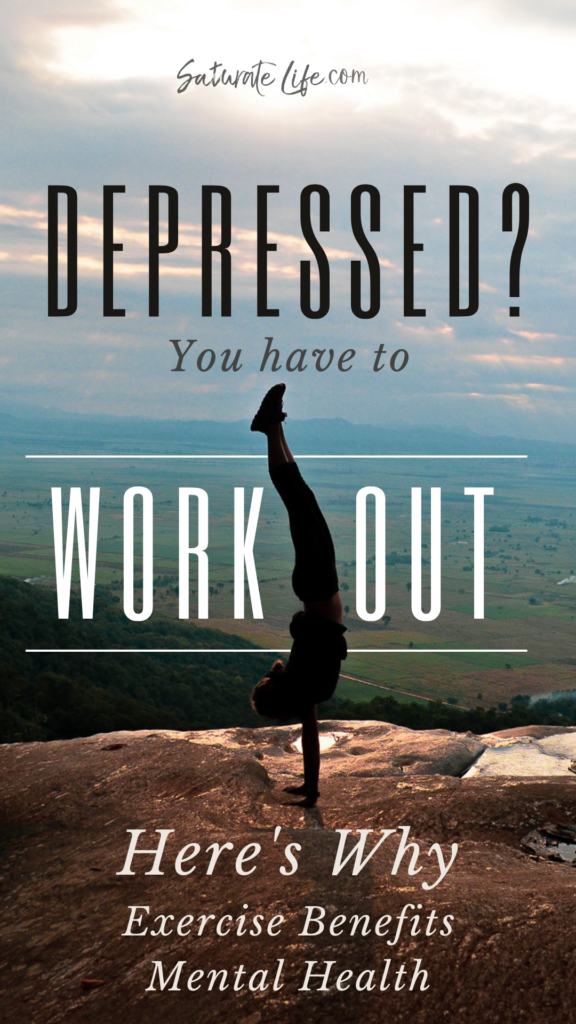Exercise to help with depression is one of the most common things suggested. There are many things that is suggested that changes life but exercise to help with depression is definitely one of the most common ones. It’s bemusing. Exercising to help with depression makes little sense. Why? What can we tell ourselves to prioritize this activity when there is no energy to be found.
Depression is difficult. It hits like an ocean wave and drags someone down it’s depths. An appointment is made to talk to the doctor about drowning in it:

“Are you exercising? Exercising helps”
– Doctors galore
Inquiring about exercise is one of the first thing commonly said in the evaluation. Aw shucks. I’ll just put on my workout sneakers and be right as rain when I don’t even have energy to clean my kitchen. No problem. Thanks for making me wait in the clinic for that! I’m no doctor but Initially the push for exercise to help with depression is further exhausting. It’s as though there is no sympathy for the literal lack of energy. Prescribe the SSRI and I can move on thankyouverymuch.
In all seriousness: Exercise is greatly beneficial for helping with depression symptoms.
You have to work out to help mental health.
Disclaimer: Doctors suggest this, but I’m not a medical professional. Discuss with your doctor.
Here’s why exercise is great for depression and anxiety:
1) Neurotransmitter release aka Hormone Change
Exercise can trigger the release of neurotransmitters like endorphins, dopamine, and serotonin. Endorphins are typically described as “feel-good” hormones because they can reduce pain and create a sense of euphoria. Dopamine is associated with pleasure and reward, while serotonin plays a crucial role in mood regulation. These neurotransmitters firing with each rep help alleviate feelings of anxiety and depression. 1

2) Stress reduction
Physical activity can act as a natural stress-reliever. Yoga is a fantastic example I love. When you exercise, your body’s stress hormones, such as cortisol, decrease, leading to a reduction in stress and anxiety levels. 2, 4
3) Cognitive Benefits
Regular exercise can improve cognitive function, including better memory, increased focus, and enhanced problem-solving skills. These cognitive improvements can positively affect one’s ability to cope with stress and anxiety. 3

4) Distraction and Coping mechanism
Angry punching a bag is a way to handle negative emotions. Stress yoga breathing and stretches is something I have legitimately partaken in. Engaging in physical activity can provide a healthy distraction from negative thoughts and worries. It can also serve as a positive coping mechanism, allowing individuals to manage their emotional challenges effectively. 4
5) Social Interaction
Many group fitness classes, team sports, or even walking or jogging with a friend are great examples of the social aspect that goes hand and hand with exercise. Social interactions can provide a sense of support, belonging, and improved mood for stronger mental health. 5

6) Improved Self-Esteem
Exercise leads to a conventionally attractive body. The to improvements in physical health and appearance, which, in turn, can boost self-esteem and self-confidence. Feeling better about oneself can positively impact mental health. 6
7) Brain Plasticity and Neurogenesis
Some research suggests that exercise can stimulate brain plasticity and neurogenesis—the growth of new neurons in the brain—which can be beneficial for mood regulation and overall mental health. 7

8) Better Sleep
Regular physical activity is associated with improved sleep quality. This can significantly impact mood, energy levels, and overall mental well-being. 8
Getting started is always the hardest part.
People complain most about not being able to keep an exercise routine. If that’s the problem then it’s a constant state of getting started in an exercise routine for your mental health. Therefore getting started is routinely the hardest part.
Every day there’s an internal fight to get started for that day.
It’s okay to keep it simple to get started having an exercise routine. Simple > none at all. Waking up, flinging the arms above the head for a big morning stretch counts. This is a confession, but I let the cats into the backyard and then do literally “Head, Shoulder, Knees, and Toes” dance routine while singing softly to myself while looking at the clouds in the sunrise. No matter how silly it is it works. Trust me.
There are more ways to get started exercising I’ll explain in a future post!
Take a deep breath. You got this,
Rachel McG.

- Lin TW, Kuo YM. Exercise benefits brain function: the monoamine connection. Brain Sci. 2013 Jan 11;3(1):39-53. doi: 10.3390/brainsci3010039. PMID: 24961306; PMCID: PMC4061837. Click Here for the study
- Nowacka-Chmielewska M, Grabowska K, Grabowski M, Meybohm P, Burek M, Małecki A. Running from Stress: Neurobiological Mechanisms of Exercise-Induced Stress Resilience. Int J Mol Sci. 2022 Nov 1;23(21):13348. doi: 10.3390/ijms232113348. PMID: 36362131; PMCID: PMC9654650. Click Here for the study
- Mandolesi L, Polverino A, Montuori S, Foti F, Ferraioli G, Sorrentino P, Sorrentino G. Effects of Physical Exercise on Cognitive Functioning and Wellbeing: Biological and Psychological Benefits. Front Psychol. 2018 Apr 27;9:509. doi: 10.3389/fpsyg.2018.00509. PMID: 29755380; PMCID: PMC5934999. Click here for the study
- Garber MC. Exercise as a Stress Coping Mechanism in a Pharmacy Student Population. Am J Pharm Educ. 2017 Apr;81(3):50. doi: 10.5688/ajpe81350. PMID: 28496270; PMCID: PMC5423066. Click here for the study.
- Lindsay Smith G, Banting L, Eime R, O’Sullivan G, van Uffelen JGZ. The association between social support and physical activity in older adults: a systematic review. Int J Behav Nutr Phys Act. 2017 Apr 27;14(1):56. doi: 10.1186/s12966-017-0509-8. PMID: 28449673; PMCID: PMC5408452. Click here for the study
- Zamani Sani SH, Fathirezaie Z, Brand S, Pühse U, Holsboer-Trachsler E, Gerber M, Talepasand S. Physical activity and self-esteem: testing direct and indirect relationships associated with psychological and physical mechanisms. Neuropsychiatr Dis Treat. 2016 Oct 12;12:2617-2625. doi: 10.2147/NDT.S116811. PMID: 27789950; PMCID: PMC5068479. Click here for the study
- Lin TW, Tsai SF, Kuo YM. Physical Exercise Enhances Neuroplasticity and Delays Alzheimer’s Disease. Brain Plast. 2018 Dec 12;4(1):95-110. doi: 10.3233/BPL-180073. PMID: 30564549; PMCID: PMC6296269. Click here for the study
- Kline CE. The bidirectional relationship between exercise and sleep: Implications for exercise adherence and sleep improvement. Am J Lifestyle Med. 2014 Nov-Dec;8(6):375-379. doi: 10.1177/1559827614544437. PMID: 25729341; PMCID: PMC4341978. Click here for the study


